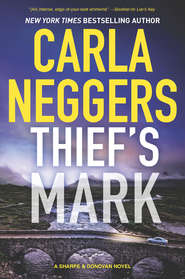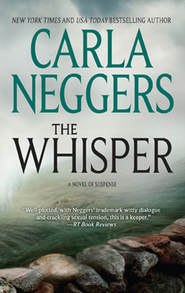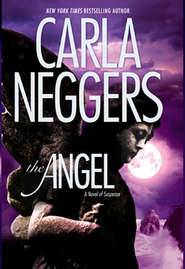По всем вопросам обращайтесь на: info@litportal.ru
(©) 2003-2024.
✖
Cold Ridge
Автор
Год написания книги
2018
Настройки чтения
Размер шрифта
Высота строк
Поля
She avoided stepping in the blood. It wasn’t easy—there was so much of it. Louis…he can’t be dead. I just saw him!
She had only rudimentary first aid skills. She wasn’t an ER doctor like her sister or a highly trained combat paramedic like North and Manny Carrera. But they weren’t here, and she forced herself to kneel beside Louis Sanborn and control her horror and fear as she touched two fingers to his carotid artery. That was it, wasn’t it? Arteries beat with the heart. Veins didn’t. To see if he had a pulse, she had to find an artery.
There was no pulse, not with that much blood.
“Louis. Oh, God.”
She looked around the empty room, her voice echoing as she yelled again for help. Had he fallen and landed on a sharp object—a stray chisel or a saw, or something? The back of his suit was unmarred. No blood, no torn fabric. Whatever injury he had must have been in front. But she didn’t dare turn him over, touch him further.
She rose shakily. No one had come in answer to her yells for help. Louis Sanborn was dead. She was alone. She absorbed the reality of her situation in short bursts of awareness, as if she couldn’t take it all in at once.
Hey, Ms. Photographer, need a ride over to the big house?
What if she’d said yes? Could she have saved his life? Or would she be dead, too?
How had he died?
What if it wasn’t an accident?
It wasn’t. She knew it wasn’t.
She ran into the hall, her camera bag bouncing on her hip. Where was her cell phone? She needed to call the police, an ambulance. She dug in the pocket of her barn coat, finding her phone, but she couldn’t hang on to it and dropped it on the hardwood floor, startling herself. She scooped it up, hardly pausing as she came to the front hall.
The front door stood wide open. She thought she’d shut it when she got back from lunch. Was someone else here?
She could feel the cool November air.
“Help!”
She looked down at her cell phone, realized it wasn’t on. She hit the Power button and ran onto the front stoop, knocking over the pot of mums, hoping someone on the street would hear her. She charged down the steps to the wide sidewalk. She’d call the police, stop a passing car.
Suddenly Manny Carrera was there, as if she’d conjured him up herself. He’d danced with her at Hank and Antonia’s wedding a month ago and cheerfully offered to cut off Ty’s balls the next time he saw him.
“It’s Louis…he…” She couldn’t get out the words. “He’s—oh, God—”
Manny swept her into his embrace. “I know,” he said. “I know.”
Two
Tyler North pulled two beers out of his refrigerator and brought them to the long pine table where his mother used to sit in front of the fire with her paints. Gus Winter was in her spot now, lean, scarred and irritable—and tired, although he’d never admit to it. He took one of the beers and shook his head in disgust. “You always have to allow for the moron factor.”
“People make mistakes.”
Gus drank some of his beer. It had been a brutal day, but one with a happy ending. “Forgetting your sunscreen’s a mistake. These assholes didn’t bother to check the weather conditions. They didn’t take enough food or water. You saw how they were dressed—jeans and sneakers. It’s November. Any goddamn thing can happen on the ridge in November. They’re lucky to be alive.”
No one knew better than Gus Winter that what he said was true. Ty didn’t argue with him. He sat with his beer and stared at the fire in the old center-chimney stone fireplace. Three seventeen-year-old boys from the local prep school decided to skip classes and hike the ridge trail. If they’d stayed on it, they might have been okay, but they didn’t. By early afternoon, they were cold, lost, battered by high winds and terrified of spending the night above the treeline.
“If Fish and Game determines these guys were reckless, they’ll have to cough up the bucks for the rescue,” Ty said.
“They’re complaining because we didn’t send a helicopter! Can you imagine? They figured they’d dial 911 on their cell phones if they got into trouble—”
“That’s what they did.”
Gus snorted. “Yeah. And we came. What’s with this picture? We should have waited, let them get good and scared.” He drank more of his beer. “I’m telling you, North. The moron factor.”
Ty expected the three boys they’d just rescued were the sort of hikers the New Hampshire Department of Fish and Game had in mind when they came up with their protocol for charging expenses for search and rescues in cases of out-and-out recklessness. Rescues could be difficult and dangerous—and expensive. Lucky for the boys, they hadn’t encountered moisture. Even a light rain would have soaked their cotton clothing, a poor insulator when wet. As it was, they’d suffered mild hypothermia. And intense, warranted fear for their lives.
“I did dumb-ass things at that age,” Ty said.
“You do dumb-ass things now. But do you expect people to come to your rescue?” Gus shook his head, not waiting for an answer. “Not you, North. You’ve never expected anyone to come to your rescue in your entire life, not with your mother, may she rest in peace. Lovely woman, but in her own world. It’s the arrogance of these jackasses—”
“Let it go, Gus. We did our job. The rest isn’t up to us.”
Reckless or not, the boys today weren’t the first people he or Gus had pulled off Cold Ridge. It was unlikely they’d be the last.
But Gus wasn’t willing to let it go. “Cell phones give people a false sense of security. They should be banned.”
Without a cell phone, the kids undoubtedly wouldn’t have been missed before nightfall. They’d have ended up spending the night on the ridge—a dangerous situation that might not have had a happy ending. On the other hand, without a cell phone, they might have taken fewer risks or even gone to their classes instead of sneaking off on an illicit hike. Other hikers had made the mistake of thinking their cell phones worked anywhere and didn’t discover there were gaps in coverage until they were ass-deep in trouble and had no way to call for help. Even if they did get through, help wasn’t necessarily around the damn corner.
Either way, it was North’s job to rescue people. He did it for a living in the military, and he did it as a volunteer when he was home on leave.
Gus set his beer bottle down hard on the table. “People think because the White Mountains aren’t as high as the Rockies or the Himalayas, they’re not dangerous. The reason the treeline’s lower in the northeast than it is out west is because we’ve got such shitty weather here. Three major storm tracks meet right over us—ah, hell.” He gave a grunt of disgust. “I’m preaching to the converted. You know these mountains as well as I do.”
“I’ve been away a lot.”
That was an understatement. His career as a pararescueman had taken him on search-and-rescue missions all over the world. The pararescue motto—These Things We Do That Others May Live—underscored everything he did as a PJ in both combat and peacetime. A pararescueman’s primary mission was to go after downed aircrews. Anytime, anywhere. In any kind of terrain, under permissive or hostile conditions. If there were injuries, they treated them. If they came under fire, they took up security positions and fired back.
The job required a wide range of skills. When he enlisted and decided to become a pararescueman, Ty had only a limited understanding of what it entailed. For starters, two years of training and instruction—the “pipeline.” It began with ten weeks of PJ indoctrination at Lackland Air Force Base in San Antonio. Running, swimming, calisthenics, drownproofing. Serious sleep deprivation, or at least so it seemed at the time. Of the hundred guys who showed up for indoc with him, twenty-four were still there after four weeks. He was one of them.
Then it was on to a series of specialized schools. He went through the Army Special Forces Underwater Operations Course and Navy Underwater Egress Training—navigation swims, ditching and donning of equipment underwater, underwater search patterns, getting out of a sinking aircraft. He made it through the Army Airborne School, where he had to make five static-line jumps before he could move on to freefall school, which took him through jumps at high altitude, with oxygen, at night, during the day, with and without equipment.
Fun stuff, he thought, remembering how he’d steel himself into not quitting, just sticking with it, one day—sometimes one minute—at a time.
At Air Force Survival School he learned basic survival skills, evasion-and-escape techniques, what to do if he was captured by the enemy. Then it was on to the Special Operations Combat Medic Course and, finally, to the Pararescue Recovery Specialist Course, where, over a year or more, all the previous training got put together and more was added—advance EMT-paramedic training, advance parachute skills, tactical maneuvers, weapons handling, mountain climbing and aircrew recovery procedures. They worked through various scenarios that tied in all the different skills they’d learned, seeing their practical application for the job that lay ahead.
Then came graduation, the PJ’s distinctive maroon beret, assignment to a team—then Ty thought, the real training began.
PJs had been called SEALs with stethoscopes, ninja brain surgeons, superman paramedics—if people knew what they did at all, since so many of their missions had to be done quietly. It wasn’t a job for someone looking for money and glory. Ty cringed at all the nicknames. He thought of himself as an average guy who did a job he was trained to do to the best of his ability. He’d become a PJ because he wanted an action-oriented career where he could save lives, a chance to “search and rescue” instead of “search and destroy.”
But he could “destroy” if he had to. PJs were direct combatants, and, as such, pararescue was a career field that remained closed to women.
Ty was currently assigned to the 16th Special Operations Wing out of Hurlburt Field in the Florida panhandle. As the leader of a special tactics team, he had performed a full range of combat search-and-rescue missions in recent years, but it was seeing Carine Winter under fire last fall that had all but done him in.
The “incident” was still under investigation.
The only positive outcome of the whole mess was that Hank Callahan and Antonia Winter had met and fallen in love. Ty had missed their wedding a month ago. Antonia was too damn polite not to invite him. His behavior toward her younger sister had put a crimp in the budding romance between his friend the ER doctor and his friend the helicopter-pilot-turned-senate-candidate—fortunately, they’d worked it out.
Senator Hank Callahan.











